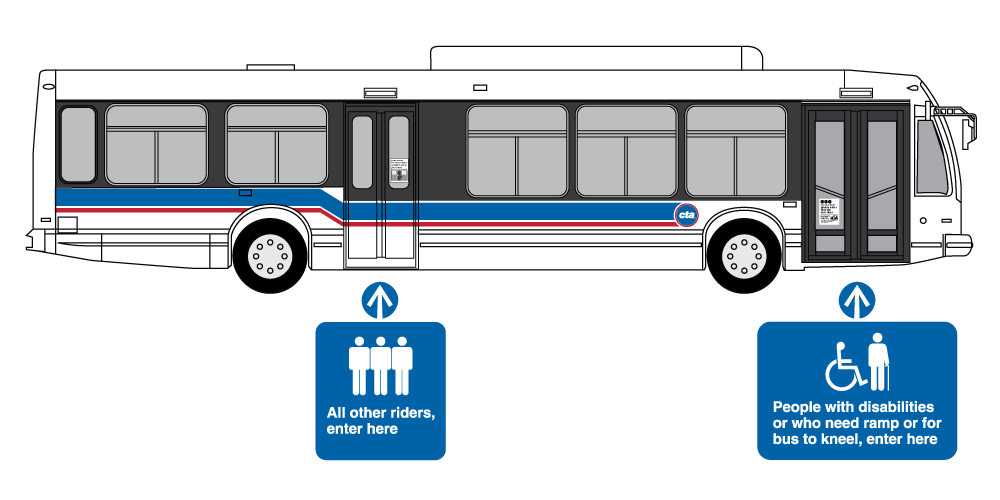When we started advocating for rear door boarding on buses in 2017 in our Back on the Bus report and in our 2018 Bus Friendly Streets Report Cards, we never thought it could become a public health imperative.
We started fighting for all-door boarding as a way to speed up service and make buses more reliable.
Now, four weeks into Illinois’ stay-at-home order, CTA and Chicago Mayor Lori Lightfoot announced that effective immediately transit riders will be encouraged to board all CTA buses through the rear door. This promotes social distancing and helps keep bus operators and transit riders safe during the COVID-19 pandemic.
At the end of March, we joined with ATU 241, the bus operator’s union, to push for rear door boarding along with measures like providing masks to operators and hazard pay. Chicago and other cities are battling staffing shortages as operators get sick or stop showing up for work because of their concerns about their own safety and the health of their families.
Rear door boarding is a huge win for the safety of everyone using and operating transit through this crisis. Now we must continue to fight for more protections for transit operators and riders alike.
Pace also announced a “Quick Board, Safe Board” policy. Chicago’s suburban bus agency will waive fare collection and encourage riders to board quickly on fixed route bus and ADA paratransit service for the duration of the Governor’s stay-at-home order.
The CTA already planned to pilot rear door boarding on two routes this summer, so several buses already have Ventra card readers installed by the back door. Now, CTA is working to install Ventra card readers on the entire bus fleet, which they say should be completed in a matter of weeks. For now, no fares will be collected to maintain social distance.
With this investment being made on all of CTA’s 1,800 buses, once the crisis is over rear door boarding should become the norm on CTA buses, as it is in San Francisco, for the time savings benefits it offers.
City and agency leaders should also embrace the recommendations from advocacy groups representing people with disabilities. We must ensure that accessibility standards are maintained and allow for people with physical disabilities and wheelchair users to board through the front door using the necessary ramp.
The federal stimulus funding for transit, which we asked Chicagoland members of Congress to support, allocates approximately $800 million in emergency funding to CTA. This makes it possible for essential service to continue to operate with an 80 percent ridership decline across the system.
Some routes are still experiencing crowding on the West and South sides. As a matter of public health and racial equity, more service must be prioritized to serve routes like 79th Street and 63rd Street to maintain social distance between riders and operators.
We will continue working with the local transit operator unions, ATU241 and ATU308, to win further protections for bus and rail operators and riders.
Join Active Trans or renew your membership now to support the fight to protect Chicago transit operators and riders during the COVID-19 crisis. You can also make a one-time donation to show your support.
UPDATE (4/22/20): Since our initial organizing in March, Chicago agencies are providing reusable cloth masks for frontline transit workers, along with gloves and hand sanitizer. As of last Friday, transit workers also have priority access to COVID-19 tests. Remaining priorities include hazard pay and reviewing and updating air filtration systems in transit vehicles.
We also continue to work at the federal level to organize in support of safer conditions for both transit operators and riders.
Active Trans joined ATU International and other members of the Transit Equity Day coalition in signing on to this letter to Congress on April 21st about the need for additional federal funding to support transit operations and hazard pay for transit operators.
Active Trans joined ATU International and dozens of other local and national advocates in this letter to Vice President Mike Pence and the White House Coronavirus Task Force on April 22nd about the need for federal action on this issue as well.
Photo credit: CTA

